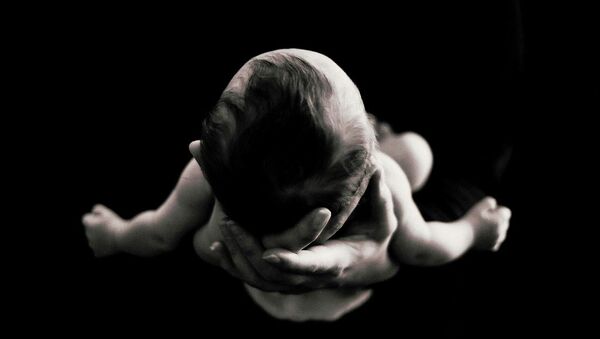The births will not be the first using this technique, but the UK is the only country to have officially approved the use of mitochondrial replacement therapy to prevent children from inheriting mitochondrial diseases. Sputnik discussed the radical therapy with Dr. Philippa Kaye, London-based general practitioner, author and journalist.
Sputnik: How has the medical community, especially specialists in the field of fertility and genetics welcomed this news?
Dr. Philippa Kaye: This news is hugely exciting and I think the gynecologists, the obstetricians and specialists within the community do welcome it because it is being carried out under the auspices ofthe Human Fertilization and Embryology Authority (HFEA), carried out in a country in which it is legal and in which there are safeguards in place and that's the real difference between these cases and the case that happened in Mexico where there isn't follow up in place and that's the real difference here.
READ MORE: A World's First: Britain Tipped to Approve 'Three-Parent Babies'
Sputnik: Could you elaborate on the safeguards that you mentioned, what exactly is in place, will these be legal safeguards or what particularly were you referring to?
Dr. Philippa Kaye: So there are lots of legal safeguards in place about donor sperm or donor eggs, about who has rights to the child. This isn't the same as genetic manipulation that people are concerned about, about designer children, choosing the color of your hair or the color of your skin. The genes involved, the DNA involved here doesn't lead to those things, it simply effects the mitochondria which are the powerhouses of the cell, so it's not the same as all the people that are concerned that we are going to be affecting personality or height or things like that.
Sputnik: Do you think that the cost will make this really available and does the government, does the NHS subsidize this in any way?
Sputnik: Can you give us an idea of how many potential parents could stand to benefit from this technology?
Dr. Philippa Kaye: From my understanding it's exceptionally rare, I've read that these women are like one in two hundred thousand, so it's exceptionally rare.
Sputnik: Many people before having children do have genetic screening, but how do people understand that they actually run the risk of passing on this damaged DNA, or mitochondrial DNA in any case?
Dr. Philippa Kaye: These women are aware that they're unwell unfortunately and that they have a specific kind of epilepsy, so you would have to have a diagnosis of a mitochondrial disorder and those are very rare and specializing involved looking at the DNA, so you would have to have a diagnosis of this first, it's not as simple as the breast cancer gene or the cystic fibrosis gene or something that we know very clearly.
Sputnik: How has the media and the public met this news, have you been hearing a lot of scepticism or resistance from conservative sectors of society?
Dr. Philippa Kaye: So the media has been reporting this for the past couple of days in all the newspapers, radio stations, television stations, and most of the comments that I have read have been quite positive and on the lines of helping people, in the HFEA (check pls 3.12) there are of course always going to be some people who are concerned about the ethics around it and I think that having that debate is actually healthy to bring those issues to light and to discuss them, but I haven't personally been made aware of lots of dissent about it.
READ MORE: UK Gives Three-Parent Baby Law The Green Light
Sputnik: I can imagine that this technique is using a new thinking, a new concept, can we imagine that other genetic disorders will also be able to be treated in a similar way or perhaps a long the same lines, or will this only be effective for mitochondrial disorders?
Dr. Philippa Kaye: At the moment this is only effective for mitochondrial disorders, but in other genetic disorders that we know about, we use preimplantation genetic diagnosis, but we don't know the genes for everything. Let's take eye color for example, because people always talk about the development of your baby's eyes. Eye color isn't one simple gene, it's not as simple as if you have this gene so you're going to have it or if you don't have this gene, you don't, so in all conditions where we know the gene and we know the problem we can choose to only put babies in that are not infected, but for most conditions there's more than one gene and it's slightly more complicated. From what we do know, when the genes are in the nucleus of the cell we can use preimplantation genetic diagnosis and now for this, which effects the mitochondrial DNA, which is different, we can now use this new technique. And these babies, if and when hopefully they're born, they will be followed up for the rest of their lives just to check, because the truth is, that right now, when it's something that's the first time, you have to monitor to see if there are any effects later on in life. We don't think that there will be, from all the research that has been done now, but it is safest to keep following them up to get as much information as we can.
Sputnik: Can you name any complications or difficulties you could possibly see occurring in children later from this procedure?
Dr. Philippa Kaye: From my understanding of how mitochondria work — no. And actually these babies should be far healthier than if they received the damaged DNA from the mothers, so this should make heathy babies, that's the whole point of it, but we will watch just to be safe.
The views and opinions expressed by Dr. Philippa Kaye are those of the speaker and do not necessarily reflect those of Sputnik.


